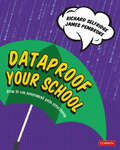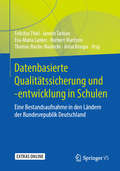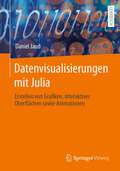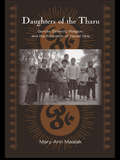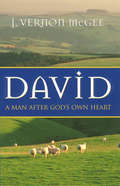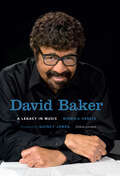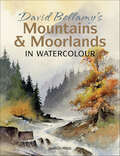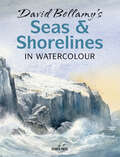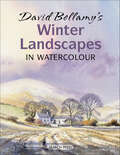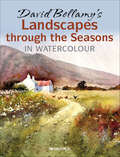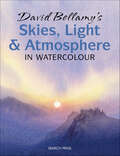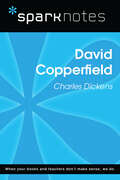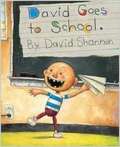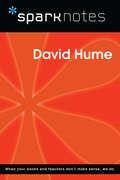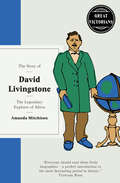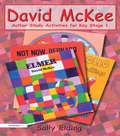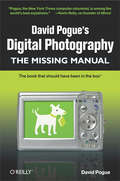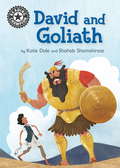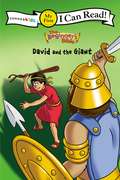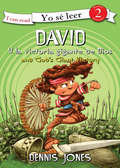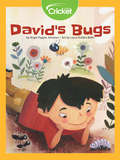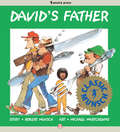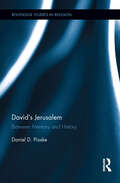- Table View
- List View
Dataproof Your School: How to use assessment data effectively (Corwin Ltd)
by Richard Selfridge James PembrokeCollecting and analysing data to monitor and challenge school standards is an increasingly important – and unavoidable – aspect of our education system. But how do we ensure we are generating useful information to support learning and make informed decisions, and not needlessly ramping up workload? This book will guide you through the different types of data schools can, and should, generate; how to make the best use of it, and what to avoid. From standardised tests and teacher assessment, to managing data and developing a data strategy, this book will equip you with the tools you need to dataproof your school. Richard Selfridge is a primary school teacher, data consultant and writer on education James Pembroke is a data analyst, blogger and consultant with 15 year’s experience working with education data. He now works for Insight Tracking.
Dataproof Your School: How to use assessment data effectively (Corwin Ltd)
by Richard Selfridge James PembrokeCollecting and analysing data to monitor and challenge school standards is an increasingly important – and unavoidable – aspect of our education system. But how do we ensure we are generating useful information to support learning and make informed decisions, and not needlessly ramping up workload? This book will guide you through the different types of data schools can, and should, generate; how to make the best use of it, and what to avoid. From standardised tests and teacher assessment, to managing data and developing a data strategy, this book will equip you with the tools you need to dataproof your school. Richard Selfridge is a primary school teacher, data consultant and writer on education James Pembroke is a data analyst, blogger and consultant with 15 year’s experience working with education data. He now works for Insight Tracking.
Datenbasierte Qualitätssicherung und -entwicklung in Schulen: Eine Bestandsaufnahme in den Ländern der Bundesrepublik Deutschland
by Felicitas Thiel Jasmin Tarkian Eva-Maria Lankes Norbert Maritzen Thomas Riecke-Baulecke Anna KroupaIm vorliegenden Buch werden auf der Grundlage einer systematischen Auswertung von Konzepten, Handreichungen, Gesetzen und Verwaltungsvorschriften die Verfahren und Regelungen zu drei zentralen Instrumenten schulischer Qualitätsentwicklung in den 16 deutschen Ländern beschrieben. Mehr als 1000 Dokumente wurden zu diesem Zweck analysiert. Damit liegt erstmals eine ländervergleichende Bestandsaufnahme vor, die für politisch-administrative Steuerungsentscheidungen sowie zukünftige Forschungsvorhaben gleichermaßen informativ ist. Der InhaltMethodische Grundlagen der Analyse bildungspolitischer und -rechtlicher Dokumente • Rahmenkonzepte zur Definition von Schulqualität • Konzeption und Implementation von Vergleichsarbeiten • Externe Evaluation • Interne Evaluation • Bildungsrechtliche Grundlagen datenbasierter Qualitätssicherung und -entwicklung • Strategien datenbasierter Steuerung zur Sicherung und Entwicklung von Schulqualität Die HerausgeberDr. Felicitas Thiel ist Professorin im Arbeitsbereich Schulpädagogik an der Freien Universität Berlin.Jasmin Tarkian und Anna Kroupa sind wissenschaftliche Mitarbeiterinnen im Arbeitsbereich Schulpädagogik an der Freien Universität Berlin.Dr. Eva-Maria Lankes ist Professorin für Schulpädagogik an der Technischen Universität München.Norbert Maritzen ist Direktor des Instituts für Bildungsmonitoring und Qualitätsentwicklung in Hamburg.Dr. Thomas Riecke-Baulecke ist Direktor des Instituts für Qualitätsentwicklung an Schulen Schleswig-Holstein.
Datenvisualisierungen mit Julia: Erstellen von Grafiken, interaktiver Oberflächen sowie Animationen
by Daniel JaudDieses Buch stellt eine Einführung in das Programmieren und das Erstellen publikationsfertiger Grafiken oder interaktiver Animationen mit der Julia-Programmiersprache dar. Ein besonderes Augenmerk liegt dabei auf einer schrittweise Auseinandersetzung mit den verschiedenen Plot-Möglichkeiten. Im Buch werden aufeinander aufbauend alle wichtigen Programmierkonstrukte zum Erstellen von Grafiken ausgearbeitet. Durch zusätzliche Aufgaben mit Beispiellösungen kann der Leser sein gelerntes Wissen nochmals selbst in der Praxis anwenden.Der InhaltErste SchritteSchleifen in JuliaErstellen einfacher GrafikenDarstellungsoptionen von Plots und Schleifen mit FunktionenVektorfelder, 3d-Plots, Oberflächen und KonturenInteraktive Anwendungen und AnimationenDer AutorDr. Daniel Jaud studierte Mathematik und Physik mit anschließender Promotion. Er unterrichtet an einem Gymnasium und ist weiterhin als freier Wissenschaftler im Bereich der mathematischen Physik tätig.
Daughters of the Tharu: Gender, Ethnicity, Religion, and the Education of Nepali Girls (Reference Books in International Education)
by Mary Ann MaslakThis book explores the complex structural institutions in society, individual attitudes towards, beliefs about and values of those institutions, and the process by which the relationship between the social structure and individual agency conditions and governs girls' educational participation in Nepal.
David
by Vernon McgeeThe Bible calls David "a man after God's own heart." But what does that really mean and how does that apply to us today? With his unusual warmth, clarity, and simplicity, Dr. McGee takes a look at the life of David, helping readers move beyond the exciting action stories and into the heart of what David's experiences have to teach us. Dr. McGee said, "Perhaps the most familiar Bible story to every boy and girl who has attended Sunday School is that of David and Goliath. It is a thrilling action story. But the greater thrill is the splendid spiritual truths that are applicable to our present-day lives as believers."
David Baker: A Legacy in Music
by Monika HerzigA Living Jazz Legend, musician and composer David Baker has made a distinctive mark on the world of music in his nearly 60-year career—as player (chiefly on trombone and cello), composer, and educator. In this richly illustrated volume, Monika Herzig explores Baker's artistic legacy, from his days as a jazz musician in Indianapolis to his long-term gig as Distinguished Professor and Chairman of the Jazz Studies department at Indiana University. Baker's credits are striking: in the 1960s he was a member of George Russell's "out there" sextet and orchestra; by the 1980s he was in the jazz educator's hall of fame. His compositions have been recorded by performers as diverse as Dexter Gordon and Janos Starker, the Beaux Arts Trio, the Composer's String Quartet and the Czech Philharmonic. Featuring enlightening interviews with Baker and a CD of unreleased recordings and Baker compositions, this book brings a jazz legend into clear view.
David Bellamy's Mountains & Moorlands in Watercolour
by David BellamyRenowned watercolourist, David Bellamy shares his passion for painting mountains and moorlands in this inspiring and practical book. There is advice on finding subjects and painting trees, water, rocks, crags and buildings, as well as an in-depth look at the painting techniques required. David's extensive travels mean that mountains and moorlands from all over the world appear in the paintings.
David Bellamy's Seas & Shorelines in Watercolour
by David BellamyLearn to paint the varied and dramatic coastlines of the world, with this guide from the expert teacher—includes four step-by-step demonstrations.Renowned watercolourist David Bellamy shares his passion for painting seas and shorelines in this inspiring and practical book. His extensive travels mean that seas and shorelines from all over the world appear in the paintings—and you can benefit from his knowledge and experience with advice on:finding subjects and painting the different moods of the searocks, crags and cliffsadding figures and animals into your artworksAlso included is an in-depth look at the painting and sketching techniques required, so painters at every level can start creating their own beautiful seascapes.
David Bellamy's Winter Landscapes
by David BellamyThis is David Bellamy’s favourite time for being out sketching, often in watercolour. In this book he explains the challenges and joys of capturing winter subjects, from how to achieve rapid pencil sketches in less than perfect conditions to painting in watercolour on the spot. Snow completely changes the landscape, simplifying it for the artist, creating marvellous opportunities for reflected light and subtle use of exciting colours. The book begins with the stunning warm colours of late autumn, then moves into the second section covering winter scenes without snow. The following deep mid-winter section shows you how to tackle snow scenes with various types of snow conditions, before we move on to the final section covering early spring. Also covered is gearing up for working outdoors in winter, techniques for rendering hoar frost on trees, misty and atmospheric effects, injecting rogue colours to add excitement to your work, how to tackle a variety of tree branches for different species, depicting light branches against dark backgrounds, altering the composition to suit your needs, and so much more. For those who really don’t wish to venture out, even on the mildest of winter days, there is a whole host of examples of winter landscapes to help you tackle this fascinating time of year. A DVD entitled Winter Landscapes in Watercolour has been produced as a companion to this book, and is available from David's website www.davidbellamy.co.uk or from APV Fiilms at www.apvfilms.com
David Bellamy’s Landscapes through the Seasons in Watercolour
by David BellamyMaster artist and best-selling author David Bellamy shares with you his techniques, ideas and approach to painting his beloved landscape throughout the year. A revised and expanded edition of David Bellamy's Winter Landscapes in Watercolour, David looks at each season in detail and explores the challenges and surprises they present to the landscape artist.Also covered are learning techniques for seasonal effects such as rendering hoar frost on trees; misty and atmospheric effects; injecting rogue colours to add excitement to your work; how to tackle a variety of tree branches for different species; depicting light branches against dark backgrounds; altering the composition to suit your needs, and so much more.
David Bellamy’s Skies, Light and Atmosphere in Watercolour
by David BellamyIn this second book in a series covering elements of the landscape, renowned watercolourist, David Bellamy shows how to paint skies, light and atmosphere and how choices involving these three key elements can affect a painting. Starting with skies, David Bellamy covers basic techniques, composition, clouds, special effects like silver linings, sunsets and shafts of light, and much more, then there is a step by step dramatic sky demonstration. Next comes light, with plenty of advice including warm and cool light, using glazes, cast shadows, light from different directions, painting the sun and reflected light, followed by a step by step demonstration featuring strong light and shadow. The atmosphere section covers haze and mist, fog, mountains in cloud, smoke and steam, rain, storms and tranquil moods, and is followed by an atmospheric step by step painting of a waterfall. David Bellamy’s extensive travels and much admired painting style ensure that there are plenty of beautiful, inspiring paintings of skies, light and atmosphere throughout the book.
David Copperfield
by Charles DickensDavid Copperfield is the eighth novel by Charles Dickens. Many elements of the novel follow events in Dickens' own life, and it is often considered as his veiled autobiography. The story follows the life of David Copperfield from childhood to maturity. David was born in Blunderstone, Suffolk, England, six months after the death of his father. David spends his early years in relative happiness with his loving, childish mother and their kindly housekeeper, Peggotty. When he is seven years old his mother marries Edward Murdstone. During the marriage, partly to get him out of the way and partly because he strongly objects to the whole proceeding, David is sent to lodge with Peggotty's family in Yarmouth. Her brother, fisherman Mr Peggotty, lives in a house built in an upturned boat on the beach, with his adopted relatives Emily and Ham, and an elderly widow, Mrs Gummidge. "Little Em'ly" is somewhat spoilt by her fond foster father, and David is in love with her. On his return, David is given good reason to dislike his stepfather and has similar feelings for Murdstone's sister Jane, who moves into the house soon afterwards. Between them they tyrannise his poor mother, making her and David's lives miserable, and when, in consequence, David falls behind in his studies, Murdstone attempts to thrash him – partly to further pain his mother. Read the book further to discover the story.
David Copperfield (SparkNotes Literature Guide Series)
by SparkNotesDavid Copperfield (SparkNotes Literature Guide) by Charles Dickens Making the reading experience fun! Created by Harvard students for students everywhere, SparkNotes is a new breed of study guide: smarter, better, faster.Geared to what today's students need to know, SparkNotes provides:chapter-by-chapter analysis explanations of key themes, motifs, and symbols a review quiz and essay topics Lively and accessible, these guides are perfect for late-night studying and writing papers.
David Goes to School
by David ShannonThere are lots of rules in school. "Don't chew gum. Don't talk without raising your hand..." and many more. David learns that only when he does a good job will his teacher say yes. When he draws on his desk, shouts out an answer, and runs to the head of the lunch line, he hears lots of "no's."
David Hume (SparkNotes Philosophy Guide)
by SparkNotesDavid Hume (SparkNotes Philosophy Guide) Making the reading experience fun! SparkNotes Philosophy Guides are one-stop guides to the great works of philosophy–masterpieces that stand at the foundations of Western thought. Inside each Philosophy Guide you&’ll find insightful overviews of great philosophical works of the Western world.
David Livingstone: The Legendary Explorer Of Africa (Great Victorians)
by Amanda MitchisonBorn a poor Glasgow cotton-mill worker, David grew up to become a great explorer and hero of his time.This is his incredible story. The tough man of Victorian Britain would stop at nothing in his determination to be the first white man to explore Africa, even if it meant dragging his wife and children along with him.He trekked hundreds of miles through dangerous territory, braving terrible illness and pain, and was attacked by cannibals, rampaging lions and killer ants…Short Books is re-releasing some of its finest writing as a newly designed series of six children’s biographies called The Great Victorians. These are entertaining and engaging stories of some of history’s most fascinating characters. They tell history in a novelistic, engaging way, a halfway house between storybooks and traditional history. There is abundant humour and drama too.With beautifully designed covers these books will catch the eyes of parents as well as children. Also published in a highly collectable set.
David McKee: Author Study Activities for Key Stage 1 (A Health Care for Women International Publication)
by Sally EldingThis innovative series is designed to help primary teachers plan focused sessions on the work of popular, well-loved and valued authors, both classic and contemporary. Each book contains a range of activities for use directly in the classroom, covering biographical information about the author; a review of the author's work and a summary of major themes in his/her key texts; key language features of the author; frameworks to help children analyze, evaluate and compare texts, and to develop personal opinions of authors' works; ideas for writing modeled on or developed from key texts; speaking and listening opportunities; drama and role play ideas; and references to video, CD-ROM, websites and ICT activities. Inside each book is a full-color pullout poster illustrating the work of the author, which also has a set of challenges for children on the back. David McKee is an author and illustrator, creator of Mr Benn, King Rollo, and the ever-popular patchwork elephant, Elmer. Building on children's enjoyment of the characters and their adventures, this book presents activities that focus on narrative structure, character development, settings and themes. Most importantly, the activities are designed to make learning about stories as much fun as reading them. Games and activities include: fortunately/unfortunately and chain of events - exploring cause and effect; comparing plots - using a matrix to order information; looking for clues about Elmer - building a character sketch; mapping feelings - exploring character development; time talk and Isabel's diary - understanding setting, sequence and relationships between the two; making a story map - recognizing picture and context clues; comparing the video to the written text; and text detective work using extracts.
David Pogue's Digital Photography: The Missing Manual (Missing Manual)
by David PogueIf you're ready to jump into digital photography or would like to increase the skills you already have, David Pogue's Digital Photography: The Missing Manual is just what you need. Bestselling author David Pogue provides a no-nonsense guide to the entire process, including how to: buy and use a digital camera; get the same photographic effects as the pros; manage the results on your Mac or PC; edit photos; and, finally, share the results with your adoring fans -- on paper, online, or on mugs, jigsaw puzzles, and blankets. After reviewing hundreds of digital cameras and photo services in his weekly New York Times column, David Pogue knows digital photography. With this new Missing Manual you will:Get expert advice on how to choose a digital camera, including information on the only specs that matter. (Hint: it's not about megapixels). Learn the basics of lighting, composition, and shooting lots of photos Understand how to choose the best camera settings for 20 different scenarios Unravel the problems of correcting images and storing them Learn David's tips and tricks for sharing and printing images Get a special troubleshooting section you can turn to when things go wrong David Pogue's witty, authoritative voice has demystified the Mac, Windows, iPods and iPhones for millions of readers. Now, he offers step-by-step instructions and plenty of friendly advice to help you join in the fun and get real satisfaction from digital photography.
David and Goliath: Independent Reading 11 (Reading Champion #506)
by Katie DaleAn exciting retelling of the famous story of David, a young shepherd boy, who faces the mighty giant warrior, Goliath, armed only with a slingshot and pebble.Reading Champion offers independent reading books for children to practise and reinforce their developing reading skills.Fantastic, original stories are accompanied by engaging artwork and a reading activity. Each book has been carefully graded so that it can be matched to a child's reading ability, encouraging reading for pleasure.Independent Reading 11 stories are the perfect introduction to first chapter books for children aged 6+ who are reading at book band 11 in classroom reading lessons.The Key Stage 2 Reading Champion Books are suggested for use as follows:Independent Reading 11: start of Year 3 or age 7+Independent Reading 12: end of Year 3 or age 7+Independent Reading 13: start of Year 4 or age 8+Independent Reading 14: end of Year 4 or age 8+Independent Reading 15: start of Year 5 or age 9+Independent Reading 16: end of Year 5 or age 9+Independent Reading 17: start of Year 6 or age 10+Independent Reading 18: end of Year 6 or age 10+
David and the Giant (I Can Read! #My First Shared Reading)
by Various AuthorsA giant wants to fight an Israelite soldier. When young and small David offers to fight Goliath, the giant laughs! Can David beat the giant? Find out in this Zonderkidz I Can Read! book for early readers.
David y la gran victoria de Dios / David and God's Giant Victory (I Can Read! / ¡Yo sé leer!)
by ZondervanBILINGUE. Todo niño aprende a leer de diferentes maneras y a su propio paso. Los libros de la serie, ¡Yo sé leer!, ayudan a desarrollar su habilidad para leer y su crecimiento spiritual a través de libros basados en historias y valores bíblicos y diferentes niveles de aprendizaje. En, David, la victoria gigante de dios, David no se ve muy fuerte al frente del gigante Goliat. ¿Podrá el ganarle la batalla con cinco piedras lisas y la fortaleza de dios?
David's Bugs
by Angie Papple JohnstonAnts, pill bugs, and grasshoppers! David loves to play with bugs!
David's Father
by Robert Munsch Michael MartchenkoJulie learns that families come in all shapes--and sizes.
David's Jerusalem: Between Memory and History (Routledge Studies in Religion)
by Daniel PioskeThe history of David’s Jerusalem remains one of the most contentious topics of the ancient world. This study engages with debates about the nature of this location by examining the most recent archaeological data from the site and by exploring the relationship of these remains to claims made about David’s royal center in biblical narrative. Daniel Pioske provides a detailed reconstruction of the landscape and lifeways of early 10th century BCE Jerusalem, connected in biblical tradition to the figure of David. He further explores how late Iron Age (the Book of Samuel-Kings) and late Persian/early Hellenistic (the Book of Chronicles) Hebrew literary cultures remembered David’s Jerusalem within their texts, and how the remains and ruins of this site influenced the memories of those later inhabitants who depicted David’s Jerusalem within the biblical narrative. By drawing on both archaeological data and biblical writings, Pioske calls attention to the breaks and ruptures between a remembered past and a historical one, and invites the reader to understand David’s Jerusalem as more than a physical location, but also as a place of memory.
